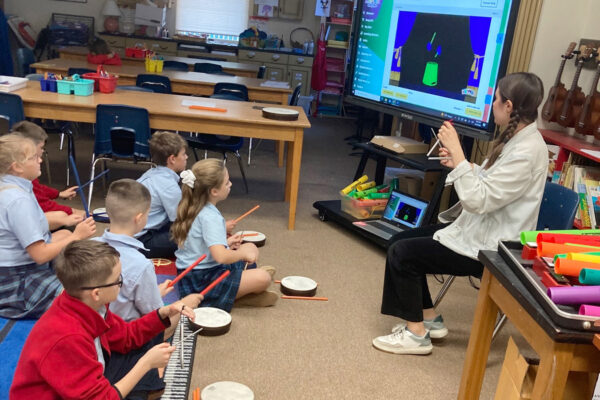Kindergarten
Sound and Movement exploration through beat, rhythm, solfege, dynamics, and tempo.
Kindergarten curriculum revolves around learning fundamental aspects of music- beat, rhythm, solfege, high/low, slow/fast. Students will initially learn to distinguish between their voices- singing, whisper, calling, and speaking through games and fun songs. We then learn how to keep a steady beat and differentiate between call and response/echo songs. Once an understanding of beat has been established, we explore through silly songs how rhythm works with but is different than the beat. High/low vs slow/fast is taught and applied to songs that are already learned. Solfege is then taught and students learn the basic music scale-Do, Re, Me, etc. Students in K5 learn new hymns for mass with each changing season-Immaculate Mary, Lord Who Throughout, Crown Him, and more. Classes meet once a week for 30 minutes.
1st Grade
Introduction to basic notes, rhythmic improvisation, and the orchestra
First grade students will focus on learning how to create and perform different rhythms. They will improve their music literacy though the study of basic notes (quarter, half, whole, quarter rest) and will demonstrate their understanding of these notes through the improvisation of rhythms on the drum. We will learn to notate and count the notes on the board and will play games clapping, marching, and singing to the rhythms we have created. Students will participate in listening activities to distinguish between different notes. In addition to notation, students will be introduced to the instruments of the orchestra and how to classify each instrument. Classes meet once a week for 40 minutes.
2nd Grade
Introduction to the musical staff. Solfege and instrument study
Second grade begins their study of the musical staff through exploration of the treble clef. They will learn the notes of the staff through acronyms and will be tested on their knowledge through fun games like “Around the World”. Students will also expand their singing skills through a more in depth study of solfege in songs. They will regularly practice identifying the notes of a song, and will learn the corresponding solfege using a “fixed-do” system, then sing the song with words and with solfege. Students will have frequent opportunities to test their pitch through fun note guessing games. Second grade will also begin to explore the structure of music and how it is composed. We will study AB and ABA form as well as Triple and Quadruple meter. Students will learn the instruments of the orchestra, how they are built, the sounds they produce and the feelings they evoke. Classes meet once a week for 40 minutes.
3rd Grade
Eighth Notes and Rests, Composition using the Pentatonic Scale, Musical Terminology
Third grade students will expand their knowledge of musical notes, learning eighth notes and rests. They will practice arranging these notes into rhythms, learning how to properly count and clap them. They will perform them on the drum afterwards. The pentatonic scale will then be introduced and students will be instructed to arrange their rhythms on the scale in quadruple meter. We will apply basic theory to help understand the importance of the tonic chord as it relates to their composition. Students will improve their musical literacy by reviewing different dynamic, tempo, and articulation markings, playing musical bingo to test their competency. Classes meet once a week for 40 minutes.
4th, 5th, 6th Grade
Sixteenth notes, the Bass Clef, Major and Minor Chords, Music in Movies and Video Games
Students in 4th, 5th, and 6th grade have music together and finish up their study of notes through examination of the bass clef. They will learn acronyms to remember notes and will understand how to read ledger lines and octaves, covering all keys on a piano. Compositional competency and ear training is built through the study of major and minor chords including how they are formed and arranged in music to produce an intended effect. Students will improve their sense of timing through the study of sixteenth notes and how they relate to other notes rhythmically. They will have the opportunity to arrange notes of differing values into 4/4, 3/4, and 2/4 meter, and then perform those rhythms on a classroom instrument. We will also study music in movies and video games, looking specifically at how music influences the reception and perceived value of a movie or game-watching clips of scenes with and without the music. Classes meet once a week for 40 minutes.
Cantor Rehearsal: Cantors from 2nd-6th rehearse every Wednesday after school. We learn new Mass settings, communion solos, and new exit hymns. We rotate cantors every week through the grades.
Music


